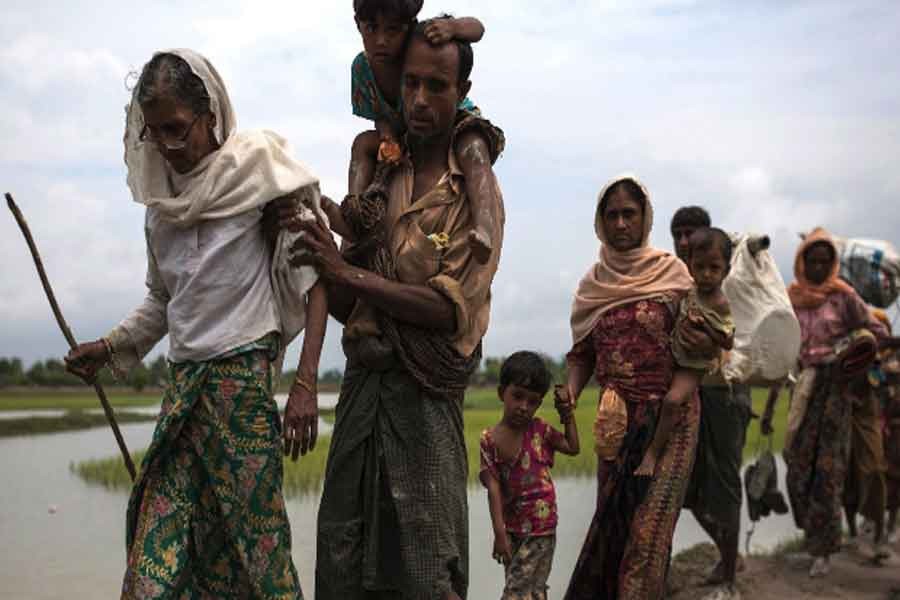
Published :
Updated :

The Rohingya crisis reflects intention of the Myanmar government to forcibly oust the Muslims from Rakhine State. The brutal attack on unarmed civilians and placing of landmines along its border by Military in coordination with Border Guard Police and armed Rakhine Buddhists is the proof. Coastal area in Rakhine state is clearly of strategic importance to both China (0ne Belt, 0ne Road Initiative) and India (Look East Policy). Myanmar government has vested interest in clearing land for development projects that brings oil and gas revenues, transit fees, employment for boosting economic growth. In such situations human costs are terribly high.
Myanmar Military as well as State Counsellor denies the mayhem but Amnesty International Director says "Given their ongoing denials Myanmar authorities may have thought they would literally get away with murder on massive scale. But modern technology, coupled with rigorous human rights research, has tipped the scale against them". BBC's South East Asia correspondent on a government-organised media trip says "0n September 07, 2017, at Alel Than Kyaw, we heard automatic weapons fire at in distant and saw four large columns of smoke indicating villages burned. Rohingya village at Gaw Du Thar Ya was being set alight by Rakhine Buddhist men in front of armed police." Both these statements confirm that "huge iceberg of misinformation" come from Myanmar itself.
Myanmar has a military-dominated government and only the Bamar Buddhist group forms the government, the police and army. In the Parliament the Military has 25 per cent reserved seat. None from the 135 recognised ethnic groups is represented in any of these positions. The role of the present elected representatives, including Aung San Suu Kyi, is to play second fiddle to the Military regime.
The Constitution of the Republic of the Union of Myanmar (2008), The Land Acquisition Act (1894), The Vacant, Fallow and Virgin Land Act (2012), Economic Zone Law (2011), Farm Act (2012) and The Foreign Investment (2012) give the government the full authority to (A) adopt "Burmanisation", (implemented since military junta came to power in 1962) and (B) to protect, control and utilise the country's natural resources. Thus "Burmanisation" and inability to find a formula for sharing the country's natural resources between Bamar Buddhists majority and 135 ethnic groups became the main reason for conflict between them. However, as the latter are not Muslims, they are not affected by the Citizen Law of 1982. They retain their citizenship, but since the assassination of late Gen Aung San voided the Panglong agreement (1947), conflicts with government continued to bedevil the country.
As they are Muslims, Rohingyas who are not part of 135 ethnic groups, are eyed with suspicion. Since Gen Ne Win's junta rule (1962), it became a part of the national policy to plan their living in squalid ghettos and apartheid conditions with severe restrictions on movement, family life, employment, healthcare and education for their children. Discriminated and persecuted, they also became victims of religious hatred led by Ashin Wirathu, branded by Time Magazine as "Face of Buddhist Terror". Wikepedia reports, in 2012 Ashin, leader of 969 Movement and Ma Ba Tha, led a rally of monks to promote President Thein Sein's controversial plan to send Rohingya Muslims to third countries. His 969 movement is related to boycott of Muslim-owned business.
Amnesty International, Human Rights Watch and United Nations Satellite Application Programme have captured the images and shared these with international media (print and electronic), international organisations and international community that prompted action by United Nations Secretary General, UN Security Council, heads of different UN Agencies and its Special Rapporteurs, European Union, US State Department officials, and 27 eminent personalities that includes 12 Nobel Laureates. Their coordinated efforts brought the following positive results: (A) quick despatch of relief materials for the Rohingya refugees; (B) the pledging by donor countries of US$434 million for continued relief programmes for Rohingyas and support to host communities in Bangladesh; (C) condemnation of Myanmar Military's excessive force and urging them to stop further violence; (D) urging Myanmar government to take steps to implement the Kofi Annan Commission Report so than an environment is created to rehabilitate the repatriated Rohingyas from Bangladesh under UN Supervision; (E) to allow a UN Fact Finding Team to visit Rakhine state.
Prime Minister of Bangladesh Sheikh Hasina has received accolades from the United Nations and leaders of the world for accommodating the Rohingya refugees. In her speech at the 72nd UN General Assembly, she placed her proposals for solutions to the crisis.
However, " Safe Zone", similar to one made at Srebrenica (Bosnia's eastern border with Serbia) by UN and defended by UN Peacekeeping Force, or the recently signed agreement between Myanmar and Bangladesh for repatriation of the Rohingya refugees will not solve the crisis or ensure repatriation of the refugees because the Military and Bamar Buddhists of Myanmar still vehemently hate the Muslims. They must change this attitude.
Will the Myanmar government act positively to solve this humanitarian crisis? The world is waiting to see.
The writer is a freelancer and political analyst. He previously worked for Bangladesh Inland Water Transport Authority and United Nations Agencies in Bangladesh, Somalia and Uganda.
bislam66@gmail.com


 For all latest news, follow The Financial Express Google News channel.
For all latest news, follow The Financial Express Google News channel.